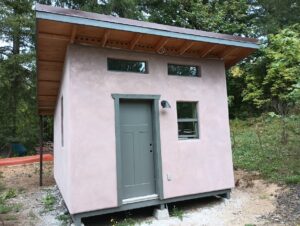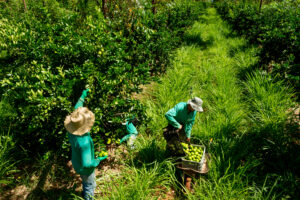About TVA
Terra Vida Academy was born out of both passion and need. Our passion for protecting nature and the need to take aggressive action to fight climate change has brought us to this point. Climate change has arrived, and is impacting humans and nature at an increasing rate. We are taking action today.
TVA offers in person classes, workshops and training for people who want to take control of their lives by learning how to live more sustainably and to learn skills that will empower them to become more self-sufficient. All classes take place in a beautiful, peaceful and natural environment at Vernonia Springs, Oregon. We believe that exposing people to nature will lead to a better understanding of why protecting it is so important. Without a healthy ecosystem, other priorities are diminished.
TVA has identified three areas of focus that we believe will have the largest positive 
Natural and Sustainable Building
According to the UN International Resource Panel, 50% of the natural resources consumed in the world are for building construction. Additionally, residential construction consumes 22% of all energy and emits 17% of total Co2 emissions (direct and indirect). By building smaller structures and utilizing natural and sustainable building methods and materials, greenhouse gas emissions can be reduced by up to 50%, outdoor and indoor air quality improved, and building material consumption and waste minimized. Read this article to learn why Small and Sustainable Housing might be the answer to the world’s housing problem.
If you would like to learn how to build your own hempcrete / sustainable home, see our building class schedule here.
Food Forests and Water Restoration
According to MIT Climate Portal, humans have cleared 50% of the forests on the planet primarily to create agricultural land. Climate change, in turn, has intensified due to the impact on land and watershed degradation and the associated acceleration of rainwater runoff, deforestation, vegetation cover decline, and groundwater depletion. Land-use and land-cover changes alter hydrology. Conversion of natural land to agricultural and urbanized land reduces soil water infiltration, worsens water quality, increases overheating of the landscape, and accelerates surface runoff, sending moisture from the continents out to the sea, in turn, raising sea levels.

In order to counteract negative land-use changes, food forests (agroforestry) combined with water restoration offers one of the most powerful solutions available to counter climate change. Food forests combine trees, shrubs, forages, grasses, livestock, and crops in innovative, flexible combinations tailored to the needs of landowners. Watch How Trees Regulate Climate: The Secret Superpowers of Nature’s Giants.
Strategic water harvesting (ponds, swales, terraces etc.) acts to capture rainfall, and in turn, rehydrate the land. Food forests and water harvesting can be used to enhance unproductive degraded agricultural land, convert residential yards/lawns to ecologically balanced food forests, and generally improve any barren land whose soil has been left unprotected. To see first hand examples of how food forests and water restoration projects can revive even the most degraded land on earth on a huge scale, watch this video: Large Scale Land Restoration Projects.
If you would like to learn more about food forests and water restoration see our class schedule here.
Yoga and Meditation Workshops
Yoga and meditation offer a range of physical, mental, and emotional benefits that can be particularly helpful while facing new challenges presented by the climate crisis. Yoga and meditation can greatly support individuals in coping with the stress, anxiety, and emotional turmoil that often accompany such a crisis.

If you would like to learn more about Yoga and Meditation see our class schedule here.


